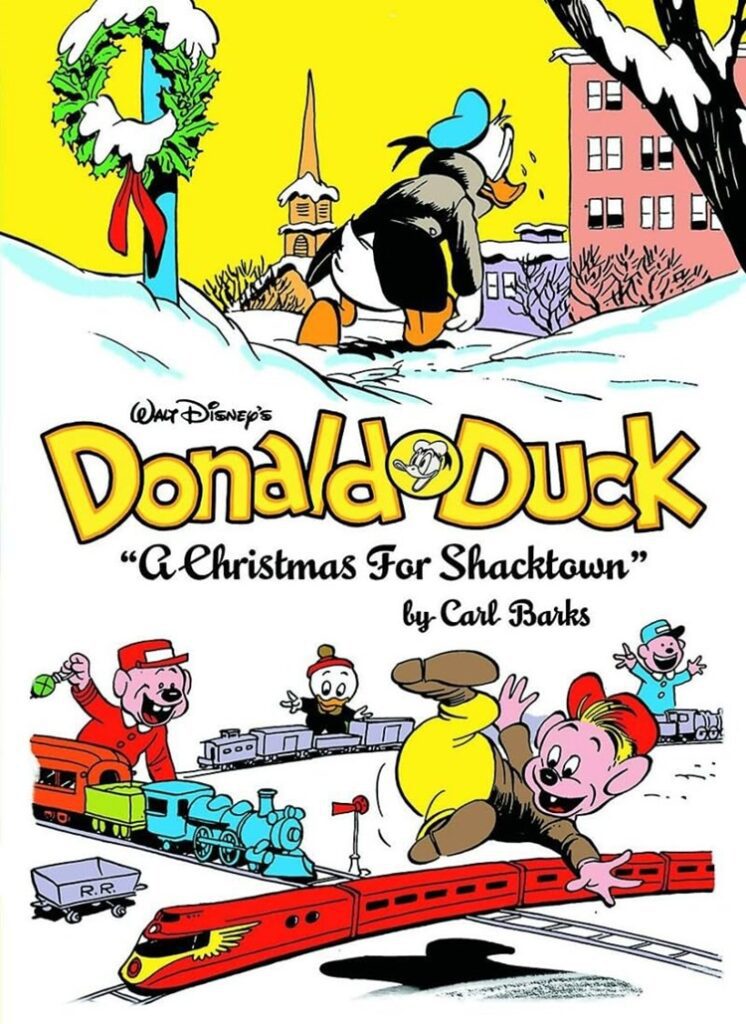
Walt Disney’s Donald Duck “A Christmas For Shacktown” is Volume 11 in Fantagraphics’ The Complete Carl Barks Disney Library. The book collects comic book stories and one-page gags from December 1951 – September 1952 featuring Donald, his family members, and friends. It concludes with “Story Notes,” annotations by a team of writers, and “Carl Barks: Life Among the Ducks,” a biography by Donald Ault.
Buy Walt Disney’s Donald Duck “A Christmas For Shacktown” by Carl BarksIn the titular story, a Christmas tale, Donald’s girlfriend Daisy and his nephews (Huey, Dewey, and Louie) want to help the poor children of nearby Shacktown celebrate. This story takes some wild turns as his lucky cousin Gladstone contributes after finding a lost wallet and Uncle Scrooge suffers for his miserly ways as his money bin falls into the earth. This development Barks an opportunity to draw numerous panels set within underground caverns. Although it was released a month before, the next story in the book finds Uncle Scrooge having newly built “The Big Bin on Killmotor Hill.” Naturally, it gets the attention of the Beagle Boys, but will Donald’s idea to keep the money safe work?
“Gladstone’s Usual Good Year” starts with Donald fretting over being able to afford a turkey dinner for Christmas. He proves to be his own worst enemy because once he finds the money, rather than go buy a turkey, he prefers the thrill of winning one through the nephews’ Junior Woodchucks raffle. He buys all but one ticket and feels confident until he learns Gladstone bought the remaining ticket. Barks shows that one can have too much of a good thing, even luck.
“The Screaming Cowboy” is the title of a song Donald wrote. It is at the center of mystery involving avalanches and a hermit who lives in the mountains, which has a funny twist to it. Even funnier is the game of one-upmanship that occurs in “Statuesque Spendtrifts” as Uncle Scrooge and the Maharajah of Howduyustan try to prove which of them is the world’s richest man through building extravagant statues. The volume concludes with “Spending Money,” a weird, comical story where Scrooge has more money than he can store, so he asks Donald to spend it for him.
Donald, the nephews, and Uncle Scrooge learn “Gladstone’s Terrible Secret,” which he keeps locked up in a safe, but the secret is so silly, it diminishes the story. Gyro Gearloose makes an appearance and returns in “The Think Box Bollix,” an invention intended to give animals the ability “to talk and do things like human beings” (why the ducks sees themselves as humans and not ducks is beyond me). Donald thinks Gyro a crackpot and tries to fool them, which almost proves fatal.
“The Golden Helmet” is quite an adventure. Donald is tasked with finding the titular relic before the villainous Azure Blue, who along with his attorney, thinks that possession of the helmet will make the holder the King of North America and all its inhabitants his slaves. Not sure how that would be enforced legally, but it gave Barks an excuse to draw many marvelous panels of waves crashing into ships as the characters travel narrow seaways through storms and during foggy nights. The helmet and power it offers is captivating to all those who hold it, like the One Ring in Tolkien’s The Lord of the Rings.
To keep the nephews busy during summer vacation, Donald plans a “Houseboat Holiday.” However, Barks knows how much fun it is to have the boys create mischief. Donald is frazzled by them putting fish in the drinking water barrel and pouring their gasoline overboard, which keeps them from returning to shore.
Donald and Gladstone briefly become “Gemstone Hunters.” After Gladstone finds a big diamond in the park, Donald is determined to outdo him. But Donald’s greed causes him to be tricked into buying a worthless piece of land. He looks for a way to pass the con job onto Gladstone with funny, unexpected results.
“The Gilded Man” is another globe-trotting adventure. Donald is a stamp collector and heads to British Guinea looking for a very rare stamp. His search takes him to the temple of “El Dorado – a huge Indian covered entirely in gold.” But finding the stamp and keeping the stamp are two things as the British Guinea Postal Service demands the letter the stamp is attached to be mailed. Surprisingly yet also not surprisingly, Gladstone’s luck prevails once again. While Donald misses out on what he desires, Barks rewards him for doing the right thing, and he rewards readers with his wonderful art detailing various setting within British Guinea, from the jungle exteriors to temple interiors.
While I enjoy the stories, I am fascinated by Barks’ approach to Donald because he is rarely the hero. Sure, it’s his name on the comic, but he is usually an antagonist, causing problems for others, such as his nephews or Gladstone, who regularly triumph over him, which in turn cause problems for himself. He’s his own worst enemy, which affects his likability. Same goes for Uncle Scrooge, whose avarice is always misguided, but particularly in these stories where he has more money than he and his heirs could ever need, his greed is so misplaced. But the ducks’ flaws lead to many humorous situations, so it’s hard to knock what works.